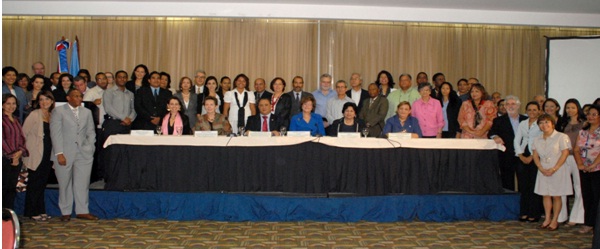Climate change education and training need to be integrated in various sectors and be linked to sustainable development strategies and objectives. This was one of the main messages of the National Workshop for the UN CC:Learn Project to Strengthen Human Resources and Skills to Address Climate Change in the Dominican Republic.
The one-day workshop took place on 7 February 2012 in Santo Domingo, Dominican Republic and was organized by the National Climate Change Council (CNCCMDL) with support of UN CC:Learn. The event brought together more than 90 participants from government, academia, the private sector, NGOs, youth organizations, the UN Country Team (FAO, UNDP, UNFPA, UNICEF, UNITAR, WHO) and other international development partners, including GIZ, USAID, and The Nature Conservancy. It set the stage for the development of a National Strategy to Strengthen Human Resources and Skills to Advance Green, Low Emission and Climate Resilient Development in the Dominican Republic over the next 6 months. 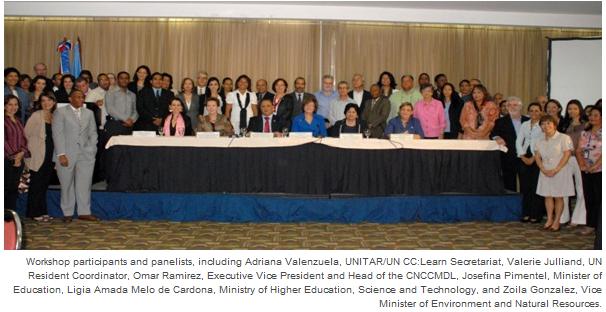
Workshop Opening
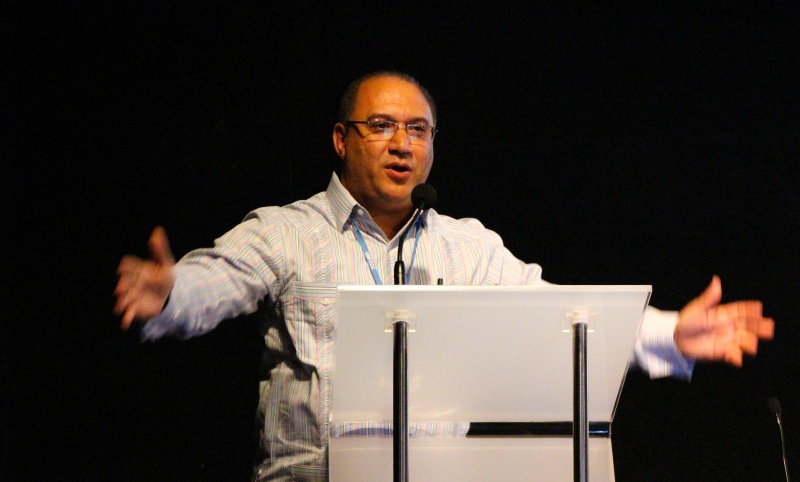 Omar Ramirez, Executive Vice President and Head of the CNCCMDL
Omar Ramirez, Executive Vice President and Head of the CNCCMDL
In his opening remarks, Mr. Omar Ramirez, Executive Vice President and Head of the CNCCMDL pointed out that education and climate change were key areas of the 2010-2030 National Development Strategy. In this context, the UN CC:Learn Project provided an excellent platform to coordinate inter-sectoral and inter-institutional actions for learning related to green, low emission and climate resilient development. Mr. Ramirez further highlighted linkages between the UN CC:Learn Project and the National Survey on the Public Awareness on and Perception of Climate Change: “The outcomes of the National Survey will facilitate the definition of activities and target groups under the National Strategy to Strengthen Human Resources and Skills to Advance Green, Low Emission and Climate Resilient Development.” Mr. Ramirez further said that the commitment of the education sector to the project was key towards introducing climate change issues in curricula for primary, secondary and higher education institutions, as well as into professional skills development programmes. He expressed his special gratitude to the Minister of Education and the Minister of Higher Education, Science and Technology for their commitment and support to the Project.
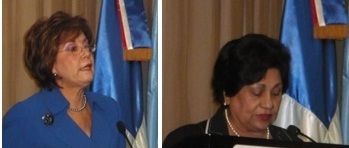 Ms. Josefina Pimentel, Minister of Education and Ms. Ligia Amada Melo de Cardona, Minister of Higher Education, Science and Technology highlighted the importance of climate change education.
Ms. Josefina Pimentel, Minister of Education and Ms. Ligia Amada Melo de Cardona, Minister of Higher Education, Science and Technology highlighted the importance of climate change education.
Ms. Josefina Pimentel, Minister of Education indicated that the Ministry of Education was currently engaged in the review of the curriculum for primary and secondary schools. 2012 therefore provided an extraordinary opportunity for integrating climate change into curricula. The UN CC:Learn Project could also identify possible actions to strengthen the capacity of education institutions. Ms. Pimentel pointed out that climate change education needed to address both, climate change adaptation and mitigation: “Climate change education can contribute to promoting the use of renewable energies, reducing energy consumption, transforming consumption and production patters, designing green technologies and controlling the loss of biodiversity.” Ms. Pimentel highlighted that if the Dominican Republic was able to strengthen awareness, knowledge and competencies of the two million people participating in the education system in the country, this would contribute to a more sustainable and peaceful society.
Ms. Ligia Amada Melo de Cardona, Minister of Higher Education, Science and Technology expressed her appreciation that attention was given to the issue of climate change education in all sectors of society. She highlighted the importance of the Strategic Plan for Science, Technology and Innovation 2008-2018 which includes a research component on Atmospheric Science and Global Change. Ms. Melo de Cardona further indicated that a Fund for Innovation and Scientific and Technological Development (FONDOCYT) has been created that includes recourses to support research projects on climate change. Ms. Melo de Cardona said: “Education, research, innovation and skills development are crucial elements to foster sustainable development.” The Ministry of Higher Education, Science and Technology was therefore committed to supporting the UN CC:Learn Project.
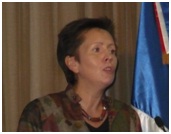 Valerie Julliand, UN Resident Coordinator
Valerie Julliand, UN Resident Coordinator
Ms. Valerie Julliand, UN Resident Coordinator in the Dominican Republic highlighted that a range of climate change actions and projects had been implemented by the Dominican Republic Government in collaboration with UN agencies. She expressed that the United Nations Country Team could play an important role in facilitating coordination and linking the UN CC:Learn Project to ongoing and planned UN-supported capacity development initiatives.
Session 1: Introductory Presentations
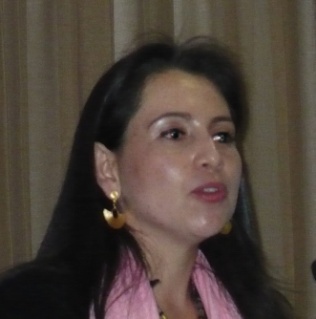 Adriana Valenzuela, UNITAR/UN CC:Learn Secretariat
Adriana Valenzuela, UNITAR/UN CC:Learn Secretariat
Ms. Adriana Valenzuela, UNITAR/UN CC:Learn Secretariat, gave an overview of UN CC:Learn from a global perspective. She explained that UN CC:Learn was a partnership of 32 multilateral organizations to foster global knowledge sharing on climate change learning and to strengthen human resources, learning and skills development in Member States through country driven processes. She presented the objectives of the national UN CC:Learn pilot projects. These include fostering a systematic and country-driven process to strengthen human resources, learning, and skills development to address climate change, determining priority action to enhance climate change learning and to strengthen national education and training systems.
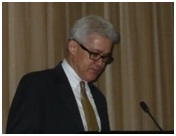 Moisés Alvarez, Under Secretary and Director, CDM Office
Moisés Alvarez, Under Secretary and Director, CDM Office
Mr. Moisés Alvarez, Under Secretary and Director, Clean Development Mechanism (CDM) Office, and National Coordinator of the UN CC:Learn Project in the Dominican Republic, presented the national framework of the project. He emphasized that the application of the Dominican Republic for the 2011-2013 pilot implementation phase had been prepared through multi-sectoral and multi-stakeholder collaboration and with engagement of national education and training institutions. Mr. Alvarez also presented the principal outcomes of the national survey on knowledge and perceptions of climate change in the Dominican Republic.
Session 2: International Experiences in the Area of Climate Change Education
Session 2 provided an opportunity for international participants to share their perspectives.
Ms. Stephanie Hodge, Education Specialist from the UN Children’s Fund (UNICEF) in New York, pointed out that climate change was not an environmental, but a cross-sectoral issue which required a multi-sectoral approach and stakeholder engagement, in particularly the participation of NGOs, children and communities. She presented various case studies on education and climate change in the Maldives, Madagascar, Philippines, Albania and Nigeria.
Ms. Lorena Santamaria, Ministry of Environment and Sustainable Development of the Government of Colombia, presented Colombia’s National Strategy for Education, Training and Public Awareness on Climate Change and linkages with the National Climate Change Adaptation and Low Carbon Development Strategy. Ms. Dorine Jean-Paul, Climate Change and CDM Office, Ministry of Environment of Haiti, presented perspectives on Article 6 of the UNFCCC and related implementation challenges. Mr. Ruperto Chaparro, Director of the Sea Grant College Program of Puerto Rico, spoke on the consequences of climate change for the sustainable management of resources such as mangroves and coastal areas in Puerto Rico. He highlighted the importance of engaging local communities in adaptation measures and to continue promoting regional experience exchange and networking.
Session 3: Taking Stock of National Climate Change Priorities, Initiatives and Capacity Development Challenges
Session 3 covered a review of the national climate change priorities, initiatives and capacity building challenges from the perspective of government, learning institutions, civil society and private sector. Panelists included representatives from the Ministry of Economics, Planning and Development, the Ministry of Education, the Ministry of Environment, INFOTEP, INTEC, RENAEPA, and CLIMACCION. An important conclusion was that all sectoral efforts should be in line with the recently approved National Development Strategy 2010-2030. The UN CC:Learn project should take in consideration and create links with the Strategy and sectoral policies, programs and projects.
Session 4: Creating Linkages with International Development Partners
Ms. Carolina Veras, UNDP presented the UN Development Assistance Framework (UNDAF) in the Dominican Republic. She said that the UNDAF 2012–2016 established the road map for the cooperation between the Government and the UN system in the country. Climate Change issues have been incorporated in the environmental sustainability and risk management area of the UNDAF. Ms. Veras presented the climate change projects that were covered by the Assistance Framework and highlighted that Article 6 and UN CC:Learn were included.
Session 5: Development of a National Strategy to Strengthen Human Resource Capacities
Ms. Adriana Valenzuela introduced the proposed methodology for developing the National Strategy. She mentioned that activities of the Project included a systematic assessment of learning needs and capabilities in key sectors, the definition of priority actions through a results-oriented approach, the preparation of the National Strategy document through consultations, and a high-level launch event.
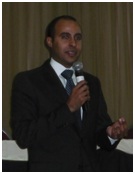 Daniel Abreu, Focal Point UN CC:Learn Project, CNCCMDL
Daniel Abreu, Focal Point UN CC:Learn Project, CNCCMDL
Mr. Daniel Abreu, Focal Point for the UN CC:Learn Project within the CNCCMDL presented the Term of Reference (TOR) and the Work Plan for Developing the National Strategy in the Dominican Republic, as well as the National Coordination Structure that includes 23 organizations. Mr. Abreu explained that the needs assessment will start in February, that the intermediary workshop to identify priorities action will take place in April, and that the launch event was scheduled for July 2012.
Session 6: Parallel Working Groups
In the afternoon three parallel working groups convened. The first reviewed the draft TOR and work plan, the second reviewed a draft agency/stakeholders analysis and a draft document list, and the third started identifying possible priority actions. The discussions generated, inter alia, the following recommendations:
- Engage local authorities, media, and church in the development of the Strategy.
- Promote the active participation of youth and civil society in the planning and implementation phases.
- Integrate gender perspectives as a cross-sectoral issue.
- Conduct a review of the priorities defined in sectoral instruments to generate links with the National Strategy.
Workshop Summary, Evaluation and Closure
In his closing remarks, Mr. Moisés Alvarez invited all institutions to support the needs assessment and participate actively in all activities organized through the UN CC:Learn Project. He invited all members of the Coordination Mechanism to participate in the Technical Follow-up Session the following day, where a review of all the technical issues of the project would take place.
About UN CC:Learn
UN CC:Learn is a partnership of 32 multilateral organizations which supports Member States in designing and implementing results-oriented and sustainable learning to address climate change. An important aspect of UN CC:Learn is to support countries in developing a National Strategy to Strengthen Human Resources and Skills to Advance Green, Low Emission and Climate Resilient Development, through a multi-sectoral and multi-stakeholder process. Core funding for the 2011-2013 implementation phase of UN CC:Learn is provided by the Swiss Government. The Secretariat for UN CC:Learn is provided by UNITAR.
For further information please contact [email protected] or visit www.uncclearn.org.

